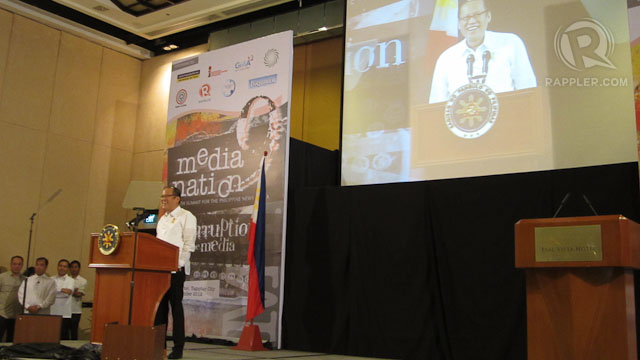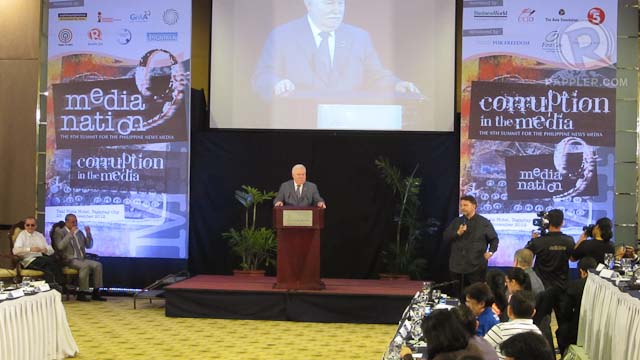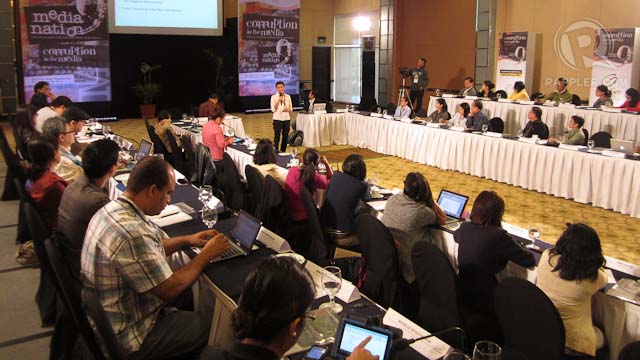SUMMARY
This is AI generated summarization, which may have errors. For context, always refer to the full article.
Destroy in order to rebuild.
That’s “creative destruction,” coined by economist Joseph Shumpeter when he described a “process of industrial mutation that incessantly revolutionizes the economic structure from within, incessantly destroying the old one, incessantly creating a new one.”
That phrase best describes the state of journalism globally — gleaned from Media Nation 9, an annual gathering of journalists in the Philippines, to a lengthy report on “Post-Industrial Journalism” in the US, to the much-awaited Leveson report, a damning indictment of the British press in general and News of the World in particular.
In his keynote to Media Nation 9, President Benigno Aquino III told journalists, “We are living in a period that can only be described as one of creative destruction” because of “the 24/7 news cycle, where mainstream media is no longer the sole gatekeeper of the news, and where enforcement and the spread of information can take place on the level of the common citizen because of the rise of social media.”

Nobel laureate and democracy icon Lech Walesa, former president of Poland, ended Media Nation on November 25 with a challenge to journalists: “We are before the big era of next revolutions. Our next generation will not allow such injustice to happen. We have to correct the systems. That’s why we have to change it. Who can do it? Media.”
Both leaders described a process of destroying what exists to create something new — Aquino referred to the world of journalism; Walesa referred to the world’s economic and political systems.

A few days later on Wednesday, November 28, Columbia University’s Tow Center for Digital Journalism released its latest report and outlined the process of creative destruction that’s redefining journalism: “It is a moment of both catastrophe and rebirth for institutions that house journalistic work…There is a story of institutional decline and collapse, a story of institutional rebirth, and perhaps most importantly, a story of institutional adaptation.”
“Post-Industrial Journalism: Adapting to the Present” destroys old notions of journalists as “merely purveyors of facts” and redefines its new role in the age of social media: “Working between the crowd and the algorithm in the information ecosystem is where a journalist is able to have most effect, by serving as an investigator, a translator, a storyteller.”
Journalists must move up the value chain with “in-depth knowledge about something other than journalism,” wrote authors Clay Shirky, C.W. Anderson, and Tow Center director Emily Bell. “The complexity of information and the speed with which people wish to have it explained and contextualized leaves little room for the average generalist.”
Journalism is moving from the age of authority to the age of authenticity. That doesn’t mean reporters give their opinions and biases. Instead, a reporter should let his or her voice and spirit shine through the work.
“The more we feel engaged with a journalist through his persona, the more we want to hear what he has to say about the world,” the report says.
Media corruption
What the report didn’t factor in is an added complication Filipino journalists deal with daily: endemic corruption. PR practitioners, government agencies and participants in Media Nation 9 estimated that as many as 9 out of 10 Filipino journalists engage in some form of corruption.
A veteran journalist spoke of reporters who attend press conferences and brazenly demand, “Anda?” — code for “where’s the money?”
Others described “gifted” reporters – those who accept and demand gifts, ranging from expensive dinners to a house and lot. Beat reporters spoke of raffles where everyone wins.

Younger reporters said they’re horrified when they see their elders accepting these gifts – in some instances, actually asking for them – from gift certificates to outright cash. Media corruption has become more sophisticated and is widely accepted. In fact, those who aren’t corrupt are criticized and ostracized by the majority who benefit from indirect, direct, and institutional corruption.
Still, talking about these practices means things are changing. Once whispered about but never discussed publicly, corruption is now front and center – the topic of this year’s Media Nation 9. It’s unique because it addressed the issue head-on and recommended steps forward.
Key to making it work, many agreed, is to harness collective action among news organizations.
Beyond the Philippines
“Media corruption has no place in media,” Walesa told journalists even as he urged us to question the values behind the economic and political systems being challenged today in global movements. “The world has never been as dependent on media as it is today,” he said.
While that may be true, on Thursday, November 29, Lord Justice Brian Leveson delivered a scathing, 2,000-page report on the culture, practices and ethics of the British press. It was prompted by an investigation triggered by a phone hacking scandal by Rupert Murdoch’s News of the World.
“Most corporate entities would be appalled that employees were involved in the commission of crime in order to further their business,” the report said. “Not so at the News of the World. When the police sought to execute a warrant, they were confronted and driven off by the staff of the newspaper.”
Leveson said the relationship between media and government in Britain is “damaging.” Over the past 35 years “and probably much longer,” politicians and the press had “developed too close a relationship in a way that has not been in the public interest,” he added.
While Leveson is harshly critical of the publishers of News of the World (which Murdoch shut down shortly after the inquiry began), he didn’t recommend criminal charges.
Instead, he outlined the formation of a new independent watchdog to be set up by a new law: “There should be legislation to underpin the independent self-regulatory system.” That’s caused much debate and controversy.
Leveson said there’s “a cultural tendency within parts of the press vigorously to resist or dismiss complainants almost as a matter of course” instead of using their power to resort to “high-volume, extremely personal attacks on those who challenge them.”
The report talks about an “ethical vacuum” on the Internet, the global “network of networks” and acknowledges, “It is clear that the enforcement of law and regulation online is problematic.”
Role of journalists
Things are changing. Power structures are collapsing. Unethical practices are coming to light.
In the Philippines, media’s soul-searching is in full swing, a move to anticipate and deal with pitfalls ahead.
Some of the findings of the Leveson report could just as easily apply in this country, and the Tow Center report is a foreshadowing of problems ahead.
Will we have the courage to forge ahead: to break up cozy relationships between politicians and the press, to give up money that doesn’t belong to us, to blow the whistle on our friends?
Reforming an institution from within is harder than a scorched-earth policy. Still, I think the phoenix rising out of the ashes will bring greater transparency, and the journalist’s role will be as essential in the future as it is today.
Society will always need “a truth-teller, sense-maker, explainer” and “a cadre of full-time workers who report the things that someone somewhere doesn’t want reported.” – Rappler.com
Add a comment
How does this make you feel?
There are no comments yet. Add your comment to start the conversation.